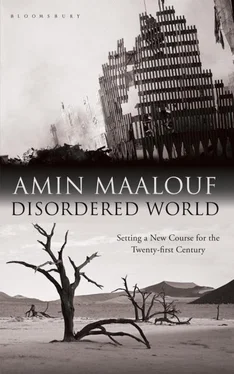Today, genealogical legitimacy retains a certain importance, but another form of legitimacy has been added to it — or sometimes replaced it — which could be called patriotic or combative legitimacy. In the eyes of some Muslims, legitimacy belongs to whoever leads the fight against their enemies. This is similar to the case of General de Gaulle in June 1940: he spoke for France not because he had been elected or because he held effective power, but because he bore the torch in the struggle against the occupier.
This comparison is necessarily approximate. However, it seems to me to hold a useful key to decoding what has been happening in the Arab-Muslim world for several decades — perhaps for far longer, but I prefer to stick to what I myself have noticed as someone born in Lebanon into a family of teachers and journalists, who then emigrated to France and who has never tired of observing the region of his birth and trying to understand and explain it.
From the moment I first opened my eyes, I have seen a procession of different people who believed they possessed patriotic legitimacy, who spoke in the name of their people, or of all Arabs, and sometimes even of all Muslims. The most important of them all was incontestably Gamal Abdel Nasser, who ruled Egypt from 1952 until his death in 1970. I am going to talk at length about him — his meteoric rise and equally spectacular fall and sudden disappearance — because it seems to me that the crisis of legitimacy that Arabs are experiencing today dates from his time. It is a crisis which is contributing to our disordered world and to the drift towards uncontrolled violence and decline.
But before I go into Nasser’s career in more detail, I would like to try to work out this notion of patriotic legitimacy more fully using a particular case, a very particular and perhaps even unique case in the modern history of the Muslim world: that of a leader who was able to lead his people out of collapse, thereby meriting his legitimacy as a fighter, and who demonstrated in remarkable ways the strength and uses of such an asset. I am talking of Atatürk.
After the First World War, when the territory of present-day Turkey was divided between various allied armies, and the great powers assembled at Versailles and Sèvres were dealing with peoples and lands without compunction, Atatürk, then an officer in the Ottoman army, dared to say no to the victors. When so many others were bemoaning the unjust decisions which had befallen them, Kemal Pasha took up arms, drove the foreign troops from his country and forced the great powers to revise their plans.
This unusual approach — both the audacity to resist adversaries who were reputed to be invincible and the ability to emerge as victor — meant Atatürk had earned his legitimacy. Having become father of the nation overnight, the former army officer now had a long-term mandate to reshape Turkey and its people as he wished. He undertook this task with gusto. He brought an end to the Ottoman dynasty, abolished the caliphate, proclaimed the separation of religion and state, established strict secularism, demanded that his people Europeanise, replaced the Arabic alphabet with the Roman one, obliged men to shave and women to take off their veils, and exchanged his own traditional headdress for an elegant Western-style hat.
And his people followed him. They let him shake up their behaviour and their beliefs without too much objection. Why? Because he had given them back their pride. Someone who has restored a people’s dignity can get them to accept many things. He can impose sacrifices and restrictions on them and can even behave tyrannically. He will still be listened to, defended and obeyed. Not for ever, but for a long time. Even when he takes on religion, his fellow citizens still won’t abandon him. In politics, religion is not an end in itself, but one consideration among many. Legitimacy is not accorded to the most devout, but to whoever fights the same fight as the people.
Few people in the East saw any sort of contradiction in the fact that Atatürk fought with great determination against the Europeans while his dream was to Europeanise Turkey. He was not fighting against this or that group; he was fighting in order to be treated with respect, as an equal, as a man, not as a native. As soon as their dignity was restored, Kemal and his people were ready to go a long way down the road to modernity.
The legitimacy which Atatürk attained outlived him and present-day Turkey is still governed in his name. Even those who do not share his convictions still feel the need to display a certain allegiance to him. Nonetheless, one might wonder how long the edifice will hold in the face of growing religious radicalism and with European nervousness. How can the Kemalists convince their people to Europeanise, if the Europeans tell them over and over that they are not European and don’t belong among them?
Many Muslim leaders dreamed of following Turkey’s example. In Afghanistan, Amanullah, a young king of twenty-six, came to power in 1919 and wanted to follow in Atatürk’s footsteps. His army launched an attack on the occupying English forces and succeeded in gaining recognition for his country. Strengthened by the prestige he had won, he embarked on ambitious reforms, forbidding polygamy and the veil, opening modern schools for boys and girls, and encouraging the development of a free press. The experiment lasted ten years, but in 1929 Amanullah was ousted in a conspiracy by traditional chiefs who accused him of impiety. He died in exile in 1960.
Reza Khan’s experiment in Persia proved more durable. He was a fervent admirer of Atatürk and, like him, an army officer. He wanted to reproduce the same modernising programme in his country, but he turned out to be unable to achieve a clean break with the past and instead founded a new imperial dynasty, the Pahlavis, rather than a European-style republic, and tried to play on the differences between the great powers rather than impose a clearly independent line. He probably lacked Atatürk’s talent, though in his defence the discovery of oil meant there was little chance of the great powers letting Iran run its own affairs. In order to remain in power, the dynasty was forced to ally itself first with the British and then with the Americans; in other words, with those nations whom the Iranian people viewed as the enemies of their prosperity and dignity.
This is a counter-example to that of Atatürk. A leader who appears to be the protégé of opposing powers will be denied legitimacy and everything he attempts will be discredited. If he wants to modernise the country, the people will oppose modernisation. If he wants to emancipate women, the streets will be full of veils in protest.
Many sensible reforms have failed because they bear the hallmark of a hated power. And conversely, many senseless acts have been applauded because they bear the seal of combative legitimacy. This holds good regardless of where the situation arises. When a proposal is put to the vote, the electorate votes not so much on its content as on the confidence they do or do not accord to the person who has put it forward. Regret and second thoughts only come later.
In Arab countries, the Turkish experiment received a more qualified welcome than elsewhere in the Muslim world. Atatürk’s bold reforms were certainly a source of inspiration for modernising elements of society, such as the Tunisian leader Habib Bourguiba, but there was also in Turkish nationalism a predisposition to distrust the Arabs, which made them unreceptive to his ideas.
For the wish to make Turkey more European was also a wish to make it less Arab. The breakup of the Ottoman empire during the First World War had begun to look like a divorce between the Sultan’s Arab and Turkish subjects. When the Hashemites in Mecca raised the standard of revolt in 1916, encouraged by the English, one of their declared objectives was that the dignity of the caliph, a title to which the Ottoman sovereigns had laid claim for four hundred years, should return to the Arabs. Freed from the Turkish yoke, the people of the Prophet would at last be able to reconnect with their past glories.
Читать дальше












